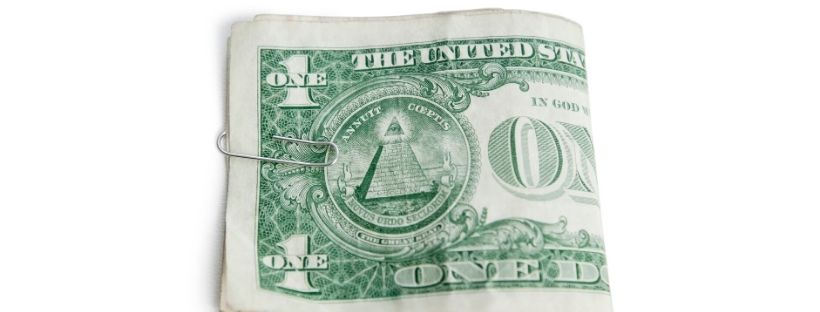MONEY PROBLEMS TO AVOID
We all make mistakes when it comes to money.
Some of us are lucky enough to learn from them earlier rather than later.
{This post may contain affiliate links, which means that I may receive a commission if you make a purchase using these links. Full disclosure policy.}
However, it’s never too late to start making changes to improve your finances.
I grew up knowing that debt was bad and that it was important to save.
What I didn’t learn was how important it was to have an emergency fund and how to make my money grow faster through investing.
Don’t worry I’ll cover that in this post, but first let’s start with the most common mistakes.

#1 NOT TRACKING YOUR MONEY
If you don’t know where your money is going, you will never know how much you have to pay off your debt, save, invest and donate.
One of the habits of the rich is telling your money where to go.
Once I started tracking my money I knew how much extra money I had a month to pay off my student loans faster.
I still try my best to track our money because instead of paying off student loans, we are now paying off our mortgages and investing more.
#2 BEING IN DEBT
We are a society that believes debt is normal.
Eight in ten Americans are in debt and most don’t even have $1,000 to their name.
I saw a meme awhile back that says if everyone in the world started out with $1,000 each, the rich would still end up rich and the poor would still be poor.
This spoke to me because it’s not about where you start, but where you end up. Your work ethic, drive, and not quitting will put you ahead of others.
So, if you have debt, create a plan to eliminate it.
#3 NOT HAVING AN EMERGENCY FUND
Emergencies come out of no where.
Maybe your car breaks down or your roof starts leaking.
Not having an emergency fund can set your progress back significantly depending on how expensive the emergency is.
Make saving $1,000 your priority and from there gradually work on reaching a number that works for you. That number may be $10,000 or it may be 3 to 6 months worth of expenses.
#4 BORROWING MONEY
If you find yourself in a tight financial bind, it may be tempting to borrow money from family or friends.
This is a big no-no because most times you cause some type of damage to the relationship.
Also, if you aren’t great at managing your finances yet, there’s a slim chance you’ll be able to pay them back in a timely manner resulting in bad feelings.
If you find yourself in a bind, cut back on these expenses immediately.
From there look for things you can sell for money, maybe have a garage sale or sell some thing online to get some quick cash to at least buy some time.
#5 NOT BUDGETING
If you’re not a “budgeter”, don’t worry neither are we, yet we were still able to pay off our credit card debt and save our first $100,000.
There are so many ways to budget your money from creating a simple spreadsheet, using the cash envelope method, the 50/20/30 method, etc.
Everyone finances are different.
Try out different methods and see which one works best for you.
Here are some money saving challenges to get you started.
#6 NOT SETTING FINANCIAL GOALS
Is your goal to pay off your credit card debt, save $10,000 in one year, or retire early?
Making goals and accomplishing them is a great way to keep you motivated to crush more goals.
Here are some great financial goals that you should try accomplishing.
Our goal was to pay off our student loans (check!), pay off our credit card debt (check!), and eventually pay off our mortgages (one of them check!).
I never would have thought being debt free was possible until I started making small goals for us and accomplishing them one at a time.
#7 NOT SAVING FOR RETIREMENT
I started saving for retirement later than I should have. The main reason was because I didn’t know better.
Lack of education is no excuse!
Fortunately for me, I had a coworker who kept hounding me to sign up for our company sponsored plan (457b).
A portion of my paycheck goes into my retirement plan and I invest in a variety of funds (index, ETF, mutual, etc.).
If your work offers any form of matching do your best to max out. That’s like getting free money.
My job doesn’t offer any matching, but I have been working hard to increase the percent I put into my retirement plan every year.
If you get a pay raise or promotion, increase your savings more. You won’t notice a difference in your paycheck, but your future self will thank you.
#8 NOT INVESTING
One of the most common money mistakes is not investing early and often.
The main reason people don’t invest is because they are 1) Scared of losing money and 2) Lack of knowledge.
I’m no genius, but I’ve learned howto open a brokerage account, open a Roth IRA, and invest in stocks and index funds.
I’ve made money and I’ve lost money. As time goes on I am more and more comfortable with moving my money around and it’s paying off. Despite the losses I have endured due to the COVID-19 pandemic, I am confident that by the time I retire my money will have grown substantially.
Here are some of my all-time favorite money books for becoming financially savvy and making smarter money moves in the future.
#9 NOT NEGOTIATING
People often think that prices and fees are set in stone. I’m here to tell you that they’re not!
I’ve gotten fees waived, cheaper prices, and better rates just by asking.
You don’t need to be rude or threatening.
Try to emphasize that you’re a valued customer or strategically suggest that you could take your business elsewhere.
To get my overdraft bank fee waived I said something along the lines of this:
Hi. I’m hoping you can help me. I have an overdraft fee on my account and this is the first time this has happened. I’ve been a customer of yours for a long time and I would really appreciate it if you could have it waived for me.
BOOM!
#10 LIVING ABOVE YOUR MEANS
I know this is easier said than done, but if you always spend less than you make you’ll be okay.
A common money mistake is buying too much home, having hefty car payments and trying to keep up with the Jones’s.
I’m not saying you can’t go on vacation or get a nice car. What I’m saying is you need to be aware of your income and expenses.
We chose to forgo the fancy cars and prefer to go on vacation two to three times a year with our kids.
Make sacrifices now so you don’t have to later.
In the beginning we cut back on eating out and vacation. We used that money to pay off our debt and build an emergency fund.
Now we can go on regular vacations and get what we want within reason without worrying about money.
#11 GETTING BEHIND ON PAYMENTS
There’s nothing wrong with using credit cards, but if you can’t pay your monthly balance in full each month you’ve got a problem.
We ended up in over $30,000 in credit card debt due to a series of unfortunate events when we moved out of our last house. Underground oil tank removal, blah, blah, blah…
We used a credit card balance transfer to get on top of our debt and ever since crushing it we’ve just gone up and up.
I don’t recommend everyone use a balance transfer, but read this post if you’d like to learn more on how a balance transfer works.
Credit card interest rates are ridiculously high and if you’re paying the minimum balance each month, most of your money is going to interest!
Track your credit card balances, due dates, and interest, and start tackling them head on.
I enjoy the debt snowball method where you pay off the lowest balances first and work your way up until all debt is paid.
Whichever method works for you, I would suggest holding off using credit cards and start using cash until you get a hold of your spending.
Pin for later!

CONCLUSION
You’re going to make several money mistakes throughout your life and that’s okay.
You might spend more than you make or wait too long to prepare for your future.
These mistakes are not only avoidable, but they’re fixable too.
Avoid debt, track your money, and live below your means!




